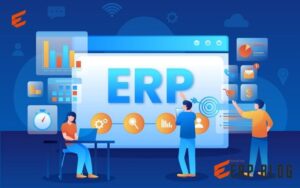ERP – Enterprise Resource Planning (ERP) technology has transformed the way businesses operate, offering integrated systems to manage core functions such as finance, human resources, supply chain, and customer relations. In today’s fast-paced business environment, companies of all sizes are leveraging ERP technology to optimize processes, increase efficiency, and reduce costs.
This article explores the significance of ERP technology, its potential benefits for businesses, and how to choose the right system to meet your organization’s unique needs. Whether you’re new to ERP or looking to upgrade, this guide will provide you with valuable insights.
Table of Contents:
Recommended ERP Technology
When evaluating ERP technology for your business, it’s crucial to consider the leading solutions available in the market. These technologies are designed to cater to diverse business needs and offer robust functionalities to optimize operations. Here are some of the top ERP systems that can drive efficiency and growth for your organization.
1. SAP ERP
SAP is renowned for its comprehensive ERP solutions that cater to businesses of all sizes. SAP ERP integrates core business processes such as finance, supply chain management, and human resources into a single platform.
This integration facilitates real-time data analysis and decision-making, enhancing operational efficiency. The cloud-based nature of SAP ERP ensures flexibility and scalability, making it suitable for global operations and companies with complex needs.
2. Oracle ERP Cloud
Oracle ERP Cloud is another prominent choice, offering advanced features and flexibility. It provides a suite of applications that manage various business functions, from financials to project management.
The cloud-based system supports scalability, allowing businesses to adjust their resources as needed. Oracle ERP Cloud is particularly known for its powerful analytics and AI-driven insights, which help organizations make informed decisions and streamline their processes.
Unlocking the Benefits of ERP NetSuite: A Comprehensive Guide

3. Microsoft Dynamics 365
Microsoft Dynamics 365 combines ERP and CRM functionalities into a single platform, offering a comprehensive solution for businesses. This system is highly customizable, allowing organizations to tailor modules to their specific needs.
Its integration with other Microsoft products ensures a seamless experience, particularly for businesses already using tools like Office 365. Dynamics 365 is designed to enhance productivity and provide a unified view of customer interactions and business operations.
Tips for Choosing ERP Technology
Selecting the right ERP technology is a crucial decision that can significantly impact your business’s efficiency and growth. To ensure you choose the best ERP system for your needs, consider the following tips:
1. Assess Your Business Needs
Before diving into ERP options, it’s essential to conduct a thorough assessment of your business processes. Identify the specific areas where your current system falls short or where improvements are needed.
This analysis should include evaluating your financial management, supply chain operations, human resources, and customer relationship management. By understanding your business’s unique requirements, you can select an ERP system that addresses these specific challenges and supports your operational goals effectively.
2. Scalability and Flexibility
A key factor to consider when choosing an ERP system is its scalability and flexibility. Your business will likely grow and evolve over time, so it’s important to choose an ERP solution that can scale with you.
Look for systems that offer modular features and can be easily expanded or upgraded as your needs change. This flexibility ensures that the ERP system remains relevant and useful as your organization grows, avoiding the need for a complete overhaul in the future.
Understanding the ERP Life Cycle: A Comprehensive Guide

3. Customization Options
Every business operates differently, and your ERP system should be able to accommodate these differences. When evaluating ERP solutions, check for customization options that allow you to tailor the system to your specific workflows and processes.
Customizable ERP systems enable you to modify features and functionalities to better fit your business model, ensuring that the software aligns with your operational requirements and enhances efficiency.
4. Vendor Support and Training
The implementation of an ERP system is a significant undertaking that requires adequate support and training. Choose a vendor that provides comprehensive customer support and training resources.
A reliable vendor should offer assistance during the implementation phase and provide ongoing support to address any issues that may arise. Additionally, look for training programs that help your team effectively navigate and utilize the ERP system.
Proper training ensures that your staff can maximize the benefits of the system and minimize disruptions to your operations.
By carefully considering these factors, you can make an informed decision when selecting an ERP technology that aligns with your business needs. Ensuring that the system you choose is scalable, customizable, and supported by a reliable vendor will help you achieve a smoother implementation and better long-term results.
FAQs
Conclusion
ERP technology is an essential tool for businesses looking to improve efficiency, streamline operations, and stay competitive in today’s marketplace. By selecting the right ERP system tailored to your company’s needs, you can enhance productivity and reduce operational costs.
Whether you opt for a well-established platform like SAP, Oracle, or Microsoft Dynamics, or explore newer options, ERP technology will play a critical role in the future of your business.
The Best ERP Administrators: Top Recommendations and Tips


